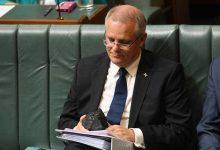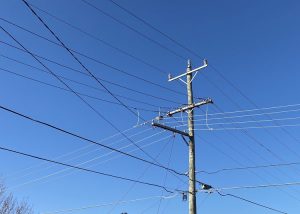A damming new report has identified which fossil fuel companies and lobby groups are exerting the greatest control over the federal government on climate policy, and it will surprise no-one to discover that the leaders are all coal companies.
A major new report from InfluenceMap, an international group that tracks lobbying activities, says that Australia’s big banks – despite their declared zero carbon targets – have remained relatively mute on climate policy.
But the fossil fuel industry has not been so shy. The noisiest group – described as the “most oppositional” – is led by Sunset Power, half owned by the outspoken Liberal Party donor Trevor St Baker, and which operates the Vales Point coal generator in NSW.
Sunset, which snapped up its coal generation asset for a mere $1 million in a NSW government fire sale, is followed by coal miners Peabody, Whitehaven and Yancoal, along with the US fossil fuel giant Chevron.
InfluenceMap says the four companies with the highest engagement on climate in Australia all represent coal, oil, or gas. Some are household names that often make a big deal of their zero carbon targets.
“In order, these companies are Santos, Origin Energy, Woodside, AGL Australia. All of these companies have lobbied for the continued use of fossil fuels in 2020-2021, despite having publicly supported net zero by 2050,” it says.
“The fossil fuel sector’s monopolization of climate lobbying is clearly delaying Australian climate policy. InfluenceMap has produced additional analysis on how individual policies are/were being lobbied by corporate Australia, using 14 significant climate policies as case studies.
“For 10 of the 14 policies, the most frequent lobbying position from the companies and industry associations was one of opposition or trying to weaken the policy in question. Six of these policies were then repealed, weakened or stalled from further ambition.
Of course, these fossil fuel groups will easily find kindred spirits within the federal Coalition government.
Both the former CEO and the deputy CEO of the Minerals Council of Australia – named as one of the top 10 most obstructive climate lobbyists in the world – have key roles in prime minister Scott Morrison’s office, and the revolving doors between the fossil fuel lobby and the government infests many other ministerial offices.
The Coalition is making little attempt to conceal its enthusiasm for fossil fuels, in fact it is trying to make it a virtue. Fossil fuel lobbyists have been put on the boards of key institutions such as the Climate Change Authority and the Australian Renewable Energy Agency, which is now being forced to direct funds to carbon capture and storage.
The InfluenceMap report comes as the UN renews pressure on Australia and other countries to cease coal generation by 2030, and a new study from the University of London says 95 per cent of Australia’s coal reserves must remain in the ground if the world is to have any chance of capping global warming of 1.5°C.
Resources minister Keith Pitt, however, says “Australia will decide” when it stops coal generation and coal exports. He has ridiculed the market operator’s commitment to make the grid ready for 100 per cent renewables as “nonsense”, but has also come under scrutiny for paid flights to fossil fuel functions, as we reveal here.
Energy and emissions reduction minister Angus Taylor, who has repeatedly argued there is “too much wind and solar” in the grid, has also been scrutinised over his contacts with Empire Energy, a gas fracking company that has been awarded a significant grant by Pitt.
Taylor has also announced more than $2 billion in support for oil refineries in Australia, but has allocated only a fraction of that amount to support electric vehicles in the government’s “Future Fuels Strategy” (FFS).
The InfluenceMap table of the 15 most active companies is topped by Santos, who chartered the flight for resources minister Keith Pitt in March, and includes Ampol and Viva Energy, who benefited from the Taylor subsidies for their refineries.
InfluenceMap Program Manager Faye Holder said the research shows there is a clear imbalance when it comes to climate policy lobbying in Australia.
“The strong lobbying activity of companies and industry groups opposed to Paris-aligned climate action is drowning out corporate voices who are pro climate but relatively disengaged,” she said in a statement.
“For example, the financial sector in Australia – which claims to support action on climate including netzero -registers relatively little policy engagement compared with the mining and energy sectors.”
Dan Gocher, the director of climate and environment at the Australasian Centre for Corporate Responsibility (ACCR) said the research confirms that a relatively small number of companies and their industry associations continue to dominate Australia’s response to climate change.
“Far too many companies claim to support the Paris Agreement, while directly and indirectly (through their industry associations) lobby for policies at odds with reducing emissions, particularly the expansion of fossil fuel extraction,” he said.
“The cognitive dissonance couldn’t be starker.
“There is no greater example of this influence than Australia’s so-called ‘gas-fired recovery’. The gas industry lobbied the Federal government extensively throughout 2020 to fast-track the development of new gas basins, distracting attention from its pandemic response.
“If we are to have any chance of an effective government response to climate change, the toxic advocacy of the most obstructive companies and industry associations must end.”








